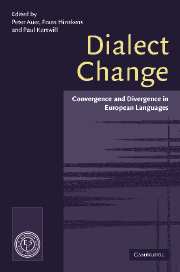Book contents
- Frontmatter
- Contents
- List of maps
- List of figures
- List of contributors
- Preface
- Map
- 1 The study of dialect convergence and divergence: conceptual and methodological considerations
- Part 1 Convergence, Divergence and Linguistic Structure
- Part 2 Macrosociolinguistic Motivations of Convergence and Divergence
- 6 Processes of standardisation in Scandinavia
- 7 The birth of new dialects
- 8 Dialect convergence in the German language islands (Sprachinseln)
- 9 Political borders and dialect divergence/convergence in Europe
- 10 The influence of urban centres on the spatial diffusion of dialect phenomena
- Part 3 Microsociolinguistic Motivations
- References
- Index
9 - Political borders and dialect divergence/convergence in Europe
Published online by Cambridge University Press: 22 September 2009
- Frontmatter
- Contents
- List of maps
- List of figures
- List of contributors
- Preface
- Map
- 1 The study of dialect convergence and divergence: conceptual and methodological considerations
- Part 1 Convergence, Divergence and Linguistic Structure
- Part 2 Macrosociolinguistic Motivations of Convergence and Divergence
- 6 Processes of standardisation in Scandinavia
- 7 The birth of new dialects
- 8 Dialect convergence in the German language islands (Sprachinseln)
- 9 Political borders and dialect divergence/convergence in Europe
- 10 The influence of urban centres on the spatial diffusion of dialect phenomena
- Part 3 Microsociolinguistic Motivations
- References
- Index
Summary
Introduction
Political borders have long been a central concern of geographers, students of international relations, and legal scholars. Since the 1960s, a growing body of sociological and anthropological research has, in addition, provided valuable new insights concerning the sociocultural aspects of border regions. Dialectologists, on the other hand, have given scant attention to the role of modern political borders in the spatial distribution and diffusion of linguistic features, generally viewing such factors as physical geography, earlier migration and settlement patterns, patterns of trade, and the influence of urban centres as linguistically far more significant.
However, with the rise of the modern nation state in the nineteenth century, accompanied in the twentieth century by the emergence of modern communications, improved transportation networks, greater geographical and social mobility of populations, and universal education, political borders have become a far more potent factor in dialect divergence and convergence. In many parts of the developed world, and particularly on the European Continent, dialect areas or dialect continua that are divided by international borders are, in many cases, beginning to show signs of divergence, either as a consequence of cross-border differences in the degree of cross-dialectal levelling or dialect maintenance, or as the result of convergence towards different superposed standard languages.
Obviously, the mere existence of a political border is insufficient to cause dialect divergence, just as the existence of social differentiation does not necessarily entail linguistic divergence within a speech community.
- Type
- Chapter
- Information
- Dialect ChangeConvergence and Divergence in European Languages, pp. 236 - 262Publisher: Cambridge University PressPrint publication year: 2005
- 10
- Cited by



